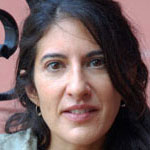An Interview with Rachel Dretzin "By Any Means Necessary" - Douglas Rushkoff
Interview with Rachel Dretzin
Why Digital Nation?

In January 2008, FRONTLINE broadcast my last film, Growing Up Online, which looked at the impact of technology on the social and emotional lives of adolescents. The reaction to the film clearly showed that we'd just scratched the surface of this enormous topic. So FRONTLINE suggested that I go back into this territory, but with a different approach -- "Why not report the film online, as you go?"
So that's how we came up with the idea for Digital Nation: a film made in pieces, published online, with a transparent reporting process, giving the audience an opportunity to give feedback and contribute as the program is being made.
What's changed in the three years since you first started reporting on digital life?
When I first started, I saw the world of the Internet as something that largely belonged to kids -- it was a place they inhabited, one that I only partly understood. In what seems like a heartbeat, however, it's me who's turned into someone who has trouble unplugging, who can't stop checking my e-mail, who struggles with distraction and multitasking and the fact that my social life is increasingly taking place more online than off.
In producing this film, I sometimes felt like I was living the issues I was reporting on. I'm not alone; most adults I know are obsessed with technology and how it's affecting them. That's relatively new.
Can you talk more about the open-source approach you took for this film? And was there anything else different in the production process?
Everything about this project was different than other films I've made. Traditionally, when we make documentaries for FRONTLINE, we shoot and report the story and then hole ourselves up in an edit room for a few months to put it all together. Until it's broadcast, it's a black box, inaccessible to the viewers.
With Digital Nation, we published our footage in rough-cut form on the Web from the start and invited our users to comment. We also created a page on our Web site, Your Stories, where people could submit their own videos about life in the digital age. The result is this amazing patchwork of experiences, several of which ended up in the final documentary.
It was very exciting -- and a little hair-raising -- to be so transparent about our process. It meant that we were in a conversation with viewers from the beginning, and I think people who have been following our progress on the Web site have much more of a stake in the final program then they would otherwise. They feel that they played a role in creating it, and they did.
How did you decide which stories to focus on?
We decided that we were most interested in stories about how technology is changing the way we live, changing what it means to be a human being. So we left out issues related to cybersecurity, politics, the economy, etc. and stuck to stories that hit close to home.
You tell several stories that relate to the military. Why so much of a focus on war?
The military has been at the forefront in using digital technologies from the beginning. They've integrated digital technology into every aspect of their process, from recruitment and training to the battlefield, and even into the way they treat troops returning with symptoms of PTSD. But what interested us most was how the use of these technologies is changing the meaning of one of the most basic human acts: the act of war. When you're a drone pilot and you can fight a battle from an air-conditioned room 7,500 miles away from the battlefield and then go home to have dinner with your kids, how does that change the experience of being at war?
Last week, the Kaiser Family Foundation released a study that indicates kids are now spending almost eight hours a day with digital media. Should the study alarm us?
Alarm us, no. Wake up call -- absolutely. This is how we live, now, and how we'll probably continue to live for the foreseeable future. The Kaiser study confirms what most people with teenagers already know: They're attached to digital media all the time. It's practically another body part at this point. I think the question now is not how do we keep them off of it, but how do we make sure they are conscious of how they are using it? How do we create a more mindful digital culture? That's what I'm interested in.
You have three children of your own. Has this experience changed the way you parent?
The short answer is yes, of course it has. I feel lucky that I'm paid to think about these issues, because it makes me a more conscious parent. But I struggle with how to handle the onslaught of technology in my kids' lives just as everyone else does. My main focus right now is on having conversations with my kids, who are old enough to speak reflectively about this stuff, rather than resorting to somewhat random rules and restrictions. If you asked them this question, they'd roll their eyes and say that all their mother wants to talk about is how we're all using digital media. I consider that a victory.
I'm also careful now to try and carve out space that's free of digital distractions. We try, but don't always succeed, in keeping iPhones and laptops out of our living/dining room in the evenings, when our family tends to hang out together. I try, but don't always succeed, to make it clear to my kids that there is a value in focusing on one thing at a time. I think I'm more aware of what we're all doing; when I walk into a room and see everyone looking at a screen, I call their attention to the fact that we're all looking at screens instead of each other.
But we live in a digital world, and much of life happens there. I'm not afraid to share both my amazement and my fears about technology with my kids. It's my hope that just by asking lots of questions and talking about it, they become more aware of the role this stuff plays in their lives.
By Any Means Necessary
by Douglas Rushkoff

The first response many people are having to early screenings of our Digital Nation project is: "What? You mean nobody really has measured the impact of technology on our brains, minds, emotions, and culture?"
But if you think about that true fact for a moment, you quickly realize -- how could anyone really measure such a thing? We still haven't measured the impact of watching television on people's brains and behavior -- and nobody's really planning to, beyond how one program or another might help somebody sell something to you.
Even if we had the money and the funding, the effort itself is probably futile, anyway. Sure, we can put people in MRIs and look at their brain activity while they're playing with computers or reading books. Or maybe we can look at the way the brains of different generations have grown or shrunk in different areas.
But none of these changes is truly occurring in isolation from other causes and effects. Television was part of a huge change in our culture and behavior -- but was this due to the fact that people were sitting and looking at a tube instead of sitting around listening to the radio (or, before that, the piano)? Or was it more the result of the new style of advertising to which they were being exposed -- those interruptive, 30-second commercials?
Or, in an even bigger context, was it the new impact of national brands and all the psychological research that went into developing them before unleashing them -- through TV -- on the general public? What if TV had started with a "pay-tv" model like HBO instead of a commercially sponsored model like CBS? Or even a publicly funded one like the BBC?
Likewise, it's hard to parse the effects of video games from those of chatting, from those of banner ads, from those of simply sitting with an illuminated screen 14 inches from your face. We can find things out -- like the fact that keeping an e-mail window open behind your document as you work makes you half as efficient as you would be without the program open. Or that if a person is taller than you in a virtual simulation, he will enjoy a huge negotiating advantage over you back in the real world.
But -- until the real research comes in decades from now, if it ever does -- the only way we have of gauging the total impact on us of living in the digital realm, is to do it on a personal level. How does using a particular technology make me feel? Does it make me feel more connected, or less, to the person I'm engaging with? Am I more likely to get mad when conversing over e-mail? Is it taking me less time, or actually more?
On top of that, we have to cope with the fact that the way we feel might not be the way we actually are. Like drunks, sometimes we overestimate our abilities under the influence. As one of the scientists we spoke with has learned, people think they are successfully multitasking, when in fact they are making many mistakes they wouldn't make were they single tasking. Likewise, we might assume, people sometimes feel closer to others online, even though some of these relationships have less true intensity, and less true substance.
And again, all of these perceptions are colored and clouded by who and what we are relating to through all these devices. The computer looks and feels different to a grandmother using it to connect with her grandchildren than to a worker who uses it to fend off commands from an irate boss or the complaints of thousands of clients. The computer is just the messenger.
Yes, our digital technologies have biases all their own: the cell phone makes us more vulnerable to the prods from others, the net makes us part of more different affiliations of people, video games increase dopamine levels. But now that they have established themselves in our lives, the biases of our technologies may be secondary to the ways in which we choose to use them.
The trick, at least for me, is to unplug from the digital for long enough to regain my bearings; re-establish myself as an organic life form, primarily, and a virtual presence only secondarily. And during those interludes, to remember what it is I want in the first place -- for myself, my loved ones, and my society.
And then to use any means at my disposal -- even digital ones -- to make that happen.